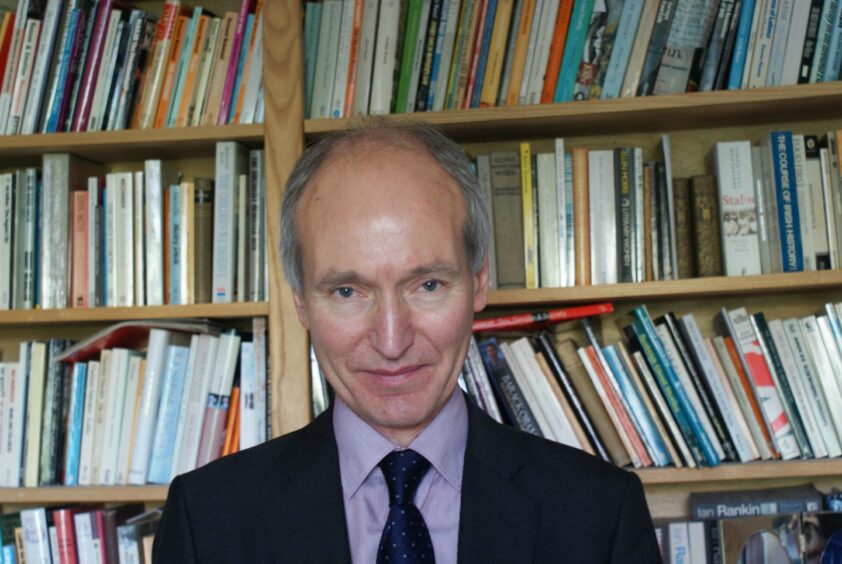
Greggs? Working class. Buckfast? Working class. The ruthless exploitation of humanity and the natural world until exhaustion or collapse? Middle class.
It was just a bit of fun, a light-hearted vox pop trailing social commentator Darren McGarvey’s BBC series exploring whether class still exists in Scotland and, if it does, does it matter?
And, while there might be no stopping the surging appeal of a Greggs’ steak bake across socio-political boundaries, class and privilege remain hot topics in our national conversation.
Edinburgh University last month warned students not to be snobbish towards peers from Scottish working-class backgrounds, for example, after admitting class-related prejudice is an issue on campus.
That came only a few days after Class Pay Gap Day when, according to the Social Mobility Foundation, working-class professionals started working for nothing compared to more privileged colleagues earning on average £6,287 (12%) more.
Jock Tamson’s bairns
If, as Scots like to insist, we are all Jock Tamson’s bairns, it seems some siblings have done, are doing and will continue to do far better than others.
Lindsay Paterson, emeritus professor of education policy at Edinburgh University, has examined the relationship between social class, education and life chances for generations and believes no other potential inequality comes close to its impact on young Scots.
He said: “Every piece of research looking at social inequality finds class, objectively measured, vastly outweighs all other dimensions of inequality such as race or sex.”
The crucial bit for Paterson, one of Scotland’s most insightful experts on education policy, is objective measurement because, subjectively, many very wealthy and well-connected Scots continue to claim to be working class.
He said: “Rich people are perfectly entitled to identify as working class but it does not help in analysing social policy and opportunity.
“It is part of the mythology of Scotland that we are all Jock Tamson’s bairns and that Scotland is a land of equal opportunity.”
Eilidh Macfarlane, an academic at Oxford University, examined the roots of class identity in Scotland and across the UK to establish why so many people continue to identify as working class despite far fewer having working-class jobs.
That contrasts with other similar countries where more people identify as middle class. Macfarlane suspects the influence of parents and their politics makes Britain different.
Publishing her research, she said: “It shows a close relationship between class identity and party identity in Britain.
“Given we’re a society so obsessed with class, it perhaps shouldn’t be surprising that how we think about our own class also reflects our politics.
“What’s particularly interesting though is that this also reflects our parents’ politics.
“Who they voted for when we were growing up contributes to explaining how we think about our own place in the world, both politically in our own party identity, and socially in our class identity.”
Paterson certainly believes the enduring notion of Scotland as a haven of equality is hard to shake.
He said: “We want to believe in that mythology, whether it is true or not, and that has implications in the real world.
“A lot of the rhetoric from all parties around not charging undergraduates fees, for example, has been about the tradition of free access to education in Scotland.
“That has led to a policy that is quite different to the rest of the UK, costs a lot of money and has implications for equality of opportunity.
“So calling the notion of equality a myth does not mean it is not real but it is a different kind of reality to the actual measurable opportunities offered to people of different income and social class.”
Identifying class
The identification of people as working or middle class is far less important than the measurable advantages wealthier parents can give their children, according to Paterson.
He said: “It is important to differentiate between class as an identity and class as a set of measurable characteristics and, by measurable characteristics, I mean, above all, money.
“Firstly, and most importantly, it comes down to money and sometimes it is easy to lose sight of that.
“It is not just money and inherited or accumulated wealth, it is what that money can buy, whether it is a better laptop or place at a fee-charging school.
“Money is the core of class but there is also status, how a person is regarded in society, which can be more about their occupation than their income.
“Then there is power and the networks parents can use on behalf of their children to secure them better opportunities, their first job, for example.
“Money can buy advantage but opportunity can also be bolstered by a culture of middle-classness or professional life.
“So those parents can pass on advantages in ways that are not financial, such as support in studies, advice on jobs, and by accessing a network of friends and colleagues.”
Paterson, a member of Reform Scotland thinktank’s Commission On School Reform, recently coauthored a report highlighting the paucity of data around education including inequality and opportunities for young people.
He said: “It’s not that we are not very good at collecting this kind of data, we are very bad at it. That information is crucial in gauging how well we are educating our children but can also, for example, track how inequality linked to social class is changing.
“A century ago the main dimension of inequality in education was access to secondary schools.
“Fifty years ago when most children went to secondaries, inequality was seen in access to undergraduate education.
“Now when more young people go to university, the inequality is in post graduate degrees when more students must rely on the financial support of their parents.
“The point when education inequality is observed may have changed but the fact of it has not.”
Scotland’s class system widening or limiting opportunity from generation to generation – through money, status and power or the lack of it – can seem immutable but, according to Paterson, can be addressed effectively.
He said: “There are real advantages and disadvantages that come with the lottery of birth and if, as a society, we believe in equality of opportunity then we should be concerned about that.
“In practice, if the main cause of inequality is financial then taking practical steps to reduce economic inequality and ease the impact of poverty would be the most effective way forward.”
Public life
Scotland is certainly not a nation that is class-blind
It was over almost as soon as it started but, for once, briefly, class rippled the surface of Scotland’s public life.
Not only were two of Holyrood’s heaviest hitters privately educated but had been just two years apart at the same £13,000-a-year school in the southside of Glasgow.
Then first minister Humza Yousaf and Scottish Labour leader Anas Sarwar sharing the same alma mater in Hutcheson’s Grammar (founded 1641) might not seem like much when 20 of the UK’s 58 prime ministers have attended Eton.
According to Hugo Rifkind, however, the novelty of two Hutchie boys debating across the Holyrood front benches only emphasises how camera-shy Scotland’s elites have become.
Rifkind, who went to school in Scotland before pursuing a successful journalistic career in London, suggests most privileged Scots much prefer to remain in the background.
He said: “At a UK level, a huge number of politicians are privately educated, as are a huge number of journalists, as are a huge number of people at the top of many different fields. Scotland might appear to be different but privately educated people are still exploiting their advantage and networks but are just doing it below the radar.”
Rifkind, the son of Sir Malcolm, the former foreign secretary, said the apparent absence of upper class Scots from the country’s public life is deceptive. He said: “Law, for example, is incredibly dominated by the privately educated, so is business, so, as a whole, is Edinburgh.
“All sorts of things are but it’s just not public facing in the same way as it is in England.
“In that way, things are slightly better in Scotland but, beneath the surface, privilege hides better.”
Rifkind, a columnist and broadcaster with The Times, has used his own school days at Loretto, Scotland’s oldest boarding school, near Edinburgh, as inspiration for his new critically acclaimed novel, Rabbits.
He is frank about the advantages his education delivered, not least in what he describes as “that public school confidence”, but says there is a reason why Scots like him are less likely to pursue a career in public life than their counterparts south of the border.
He said: “No-one will be reaching for their tiny violins but there can be something uncomfortable about being privately educated in Scotland.
“There are not many who will not feel, at some point, judged on the basis of their class. Scotland is certainly not a class-blind nation.”

Enjoy the convenience of having The Sunday Post delivered as a digital ePaper straight to your smartphone, tablet or computer.
Subscribe for only £5.49 a month and enjoy all the benefits of the printed paper as a digital replica.
Subscribe © Supplied
© Supplied